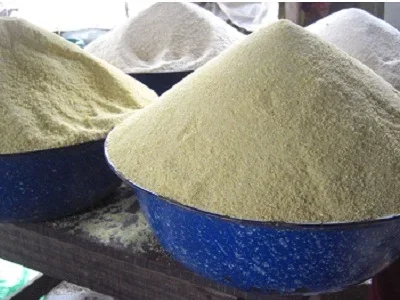Governors Accuse Jonathan’s Government Of Importing Substandard Rice During Elections
The Nigeria Governors Forum (NGF) thursday expressed concern over the substandard rice imported into the country during the administration...
https://newshelmng.blogspot.com/2017/06/governors-accuse-jonathans-government.html
The Nigeria Governors Forum (NGF) thursday expressed concern over the
substandard rice imported into the country during the administration of
former President Goodluck Jonathan, lamenting that the rice is
sometimes harmful to the human system.

They said huge consignment of rice still finding its way into the market was imported into Nigeria since 2014 when the Jonathan administration issued a very liberal import licence regime to its election financiers who were able to bring a substantial quantity of rice into the country using a waiver from the presidency at the time.
The 36 governors spoke in a statement issued by the Head, Media and Public Affairs of the NGF Abulrazaque Bello- Barkindo, which called on the Nigeria Customs Service (NCS) to expeditiously take measures to arrest the situation.
The governors claimed that while some bulk of the consignment was stale, others were either rejected in other countries or had overstayed in various warehouses before they found their way into Nigeria through the activities of some unscrupulous elements.
While summoning the customs to shed light on the matter, the governors expressed concern that Nigerians were either falling sick or losing their lives to the consumption of these substandard produce even though some states have commenced elaborate efforts to produce rice in commercial quantity with a view to halting Nigeria’s over-reliance on staples that can be produced locally.
The Governors, according to the News Agency of Nigeria (NAN) frowned at the situation where Nigerians snubbed locally-produced commodity in preference for foreign ones which were most of the time, stale, contaminated or even fake.
Meanwhile, in a brief to the governors’ forum, the NCS Comptroller-General through the Deputy Comptroller-General, Dangaladima Aminu, stated that although there is an upsurge in the smuggling of rice through the nation’s land borders, there has been no alteration to the prohibition on the importation of rice through Nigeria’s land borders and that any quantity of rice which finds its way into Nigeria through land routes was smuggled.
He noted that rice was usually smuggled into the country through unauthorised border routes which span more than 4,000km and that the smugglers were aided by border communities who alternated between motorcycles, canoes and rafts to smuggle contraband rice into the country.
Aminu added: “Your excellencies, it may interest you to note that a motorcycle can make up to 30 trips with six 50kg bags of rice per night depending on the distance and when the border communities are not smuggling the produce themselves, they are aiding or providing cover for smugglers.”
He, however, added that rice merchants had recorded huge losses as a result of seizures by the customs. He disclosed that in 2014 customs seized 12,000 metric tons of the commodity, 4,503 tonnes in 2015 and 14,000metric tons in 2016.
Aminu informed the governors that the customs “takes the issue of smuggling of rice seriously, having identified the danger posed by it to the economic well-being and health hazards it constitutes to the Nigerian people.”

They said huge consignment of rice still finding its way into the market was imported into Nigeria since 2014 when the Jonathan administration issued a very liberal import licence regime to its election financiers who were able to bring a substantial quantity of rice into the country using a waiver from the presidency at the time.
The 36 governors spoke in a statement issued by the Head, Media and Public Affairs of the NGF Abulrazaque Bello- Barkindo, which called on the Nigeria Customs Service (NCS) to expeditiously take measures to arrest the situation.
The governors claimed that while some bulk of the consignment was stale, others were either rejected in other countries or had overstayed in various warehouses before they found their way into Nigeria through the activities of some unscrupulous elements.
While summoning the customs to shed light on the matter, the governors expressed concern that Nigerians were either falling sick or losing their lives to the consumption of these substandard produce even though some states have commenced elaborate efforts to produce rice in commercial quantity with a view to halting Nigeria’s over-reliance on staples that can be produced locally.
The Governors, according to the News Agency of Nigeria (NAN) frowned at the situation where Nigerians snubbed locally-produced commodity in preference for foreign ones which were most of the time, stale, contaminated or even fake.
Meanwhile, in a brief to the governors’ forum, the NCS Comptroller-General through the Deputy Comptroller-General, Dangaladima Aminu, stated that although there is an upsurge in the smuggling of rice through the nation’s land borders, there has been no alteration to the prohibition on the importation of rice through Nigeria’s land borders and that any quantity of rice which finds its way into Nigeria through land routes was smuggled.
He noted that rice was usually smuggled into the country through unauthorised border routes which span more than 4,000km and that the smugglers were aided by border communities who alternated between motorcycles, canoes and rafts to smuggle contraband rice into the country.
Aminu added: “Your excellencies, it may interest you to note that a motorcycle can make up to 30 trips with six 50kg bags of rice per night depending on the distance and when the border communities are not smuggling the produce themselves, they are aiding or providing cover for smugglers.”
He, however, added that rice merchants had recorded huge losses as a result of seizures by the customs. He disclosed that in 2014 customs seized 12,000 metric tons of the commodity, 4,503 tonnes in 2015 and 14,000metric tons in 2016.
Aminu informed the governors that the customs “takes the issue of smuggling of rice seriously, having identified the danger posed by it to the economic well-being and health hazards it constitutes to the Nigerian people.”




